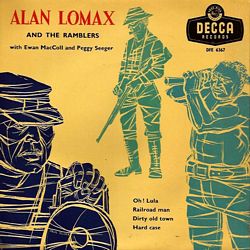

Sleeve Notes
Ewan MacColl and I were both raised with folk songs like Gypsy Davy and Careless Love right in the house with us. Ewan's father, a Scots iron puddler. used to spend the whole of Hogmanay with his pals singing Scots ballads and drinking songs. Since then, MacColl has wandered over the British Isles as a poet and an actor, picking up songs along the road. When there was no traditional song to fit a scene in one of his many plays or radio programmes, he composed one, like a true Scots bard, drawing upon a heritage of tunes and verse forms he acquired before he could read or write. Dirty Old Town, which catches the nostalgic mood of love bigtown, and Hard Case, which is couched in absolutely accurate convict lingo, are examples of this kind.
As for me, my father, John Lomax, who was America's first ballad hunter, the collector of The Boll Weevil, The Dogie, Home on the Range, and thousands more, brought me up to take over where he left off. Out of our recording trips all over the South grew the Archive of Folk Songs in Washington, and came the songs like Rock Island Line (recorded in Arkansas in 1936), Take this Hammer (recorded in Virginia in 1934), Stewball (recorded in Mississippi in 1933), and hundreds more that are now beginning to be popular in Great Britain.
On this record the Ramblers belt into their Scots, Irish and English songs with the same lack of inhibitions that characterize a Memphis jug-band or a Kentucky mountain square dance orchestra playing boogie-woogie. Sandy Brown, a ballad-loving Scotsman, sings through his clarinet. Johnny Cole, an aircraft parts worker with a real genius for the harmonica, sings his part on his small reeds. The rhythm section is composed at times of washboard and bongo drums, but it always rests upon the firm beat of Jim Bray on bass and Bryan Daley on guitar. Shirley Collins. from Hastings, sings the high parts and the soft love songs. Peggy Seeger has an uncanny instinct for accompanying everybody. Occasionally I am permitted to sing some American songs the way I heard them in the South and West when I was very young — and out of this came the new songs Oh! Lula and Railroad man. But we are all united in our hope that some day, and that not faraway, the British people will again be singing their own folk-songs which are the most beautiful and varied of Western Europe. and that the Ramblers will have helped.
Alan Lomax